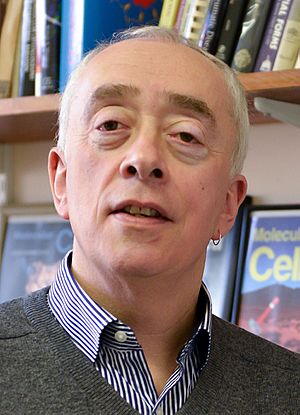Laurence Pearl facts for kids
Quick facts for kids
Laurence Pearl
|
|
|---|---|

Laurence Pearl in his office
|
|
| Born |
Laurence Harris Pearl
18 June 1956 Manchester, England
|
| Alma mater | |
| Occupation | biochemistry |
| Known for | Work on HIV-1 protease, DNA repair Enzymes, Hsp90 and GSK-3 |
| Spouse(s) | Frances M. G. Pearl |
| Children | two sons, one daughter |
| Awards | |
| Scientific career | |
| Fields |
|
| Institutions |
|
| Thesis | Crystallographic studies of endothiapepsin (1984) |
| Doctoral advisor | Tom Blundell |
Laurence Harris Pearl (born 18 June 1956) is a famous British biochemist and structural biologist. A structural biologist studies the tiny building blocks of life, like proteins, to see what they look like and how they work.
Professor Pearl is known for his important research that helps us understand and fight diseases like cancer and HIV/AIDS. He has worked at top universities, including the University of Sussex and the Institute of Cancer Research.
Contents
Early Life and Education
Laurence Pearl was born in Manchester, England. He attended the Manchester Grammar School, where he enjoyed acting in school plays.
For college, he studied Biochemistry at University College London. He then earned his Master's and PhD degrees from Birkbeck College. For his PhD, he studied a type of enzyme (a special protein that speeds up chemical reactions in the body) under the guidance of scientist Tom Blundell.
In 1984, Pearl was on a team from Birkbeck College that competed on the TV quiz show University Challenge. His team made it to the semi-finals and got one of the highest scores in the show's history!
Scientific Career
After finishing his studies, Professor Pearl worked as a researcher at Birkbeck College and the Institute of Cancer Research. In 1989, he became a lecturer at University College London and was later promoted to Professor of Structural Biology in 1996.
In 1999, he returned to the Institute of Cancer Research to lead a new department focused on structural biology. Later, in 2009, he moved to the University of Sussex to become the Head of the School of Life Sciences. He also continued his own research at the Genome Damage and Stability Centre there.
Since 2017, he has split his time between the University of Sussex and the Institute of Cancer Research, leading important research at both places.
Important Research Discoveries
Professor Pearl's research looks at the 3D shapes of proteins to understand how they cause diseases. By seeing what these proteins look like, scientists can figure out how to stop them from causing harm. This work is a key part of drug discovery, which is the process of creating new medicines.
Fighting HIV/AIDS
One of his first major achievements was studying the HIV-1 protease. This is a crucial protein that the HIV virus needs to copy itself. Professor Pearl's work helped show that this protein was a perfect target for new drugs to fight HIV/AIDS.
Understanding DNA Repair
Your body's DNA is like a set of instructions for everything your cells do. Sometimes, this DNA gets damaged. Professor Pearl has made important discoveries about how our cells fix this damage, a process called DNA repair. He studied special proteins that find and repair mistakes in DNA, which helps prevent diseases like cancer.
The Hsp90 "Chaperone" Protein
Professor Pearl also solved the mystery of a protein called Hsp90. Hsp90 acts like a "chaperone" for other proteins, helping them fold into the right shape so they can do their jobs correctly. He discovered that Hsp90 uses energy from a molecule called ATP to work. This was a huge breakthrough.
Because cancer cells rely on Hsp90 to help their own harmful proteins work, stopping Hsp90 has become a new way to treat cancer.
Awards and Recognition
Professor Pearl's amazing work has earned him many awards.
- He was elected a Fellow of the Royal Society (FRS) in 2008, one of the highest honours for a scientist in the UK.
- He is also a member of the European Molecular Biology Organisation (EMBO) and a Fellow of the Academy of Medical Sciences (FMedSci).
- In 2013, he and his team won the Cancer Research UK Translational Cancer Research Prize for their work on Hsp90, which led to the development of a new cancer drug.
- In 2018, he received the Novartis Medal and Prize for his major contributions to science.
 | Bayard Rustin |
 | Jeannette Carter |
 | Jeremiah A. Brown |

